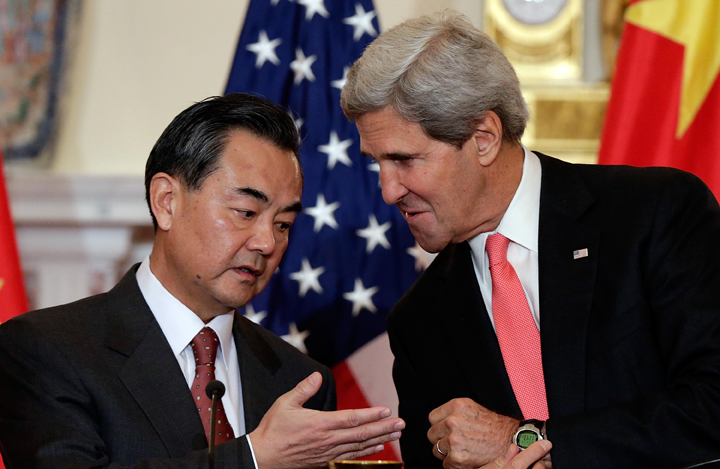WASHINGTON – Top U.S. and Chinese officials publicly aired differences Wednesday over the protests in Hong Kong, where students want democratic changes to the electoral system.

China’s Foreign Minister Wang Yi was visiting Washington as the standoff between students and authorities intensified in the Chinese territory – the stiffest challenge yet to Beijing’s authority since China took control of the former British colony in 1997, allowing it to retain more freedoms than mainland China.
President Barack Obama joined his National Security Adviser Susan Rice in a meeting with Wang, and said that the U.S. is closely following developments in Hong Kong and expressed hope that differences between Hong Kong authorities and protesters will be addressed peacefully.
“The United States has consistently supported the open system that is essential to Hong Kong’s stability and prosperity,” a White House statement about the meeting said.
The protesters oppose Beijing’s decision in August that all candidates in an inaugural 2017 election for the territory’s top post must be approved by a committee of mostly pro-Beijing local elites. Tens of thousands of people have rallied against that decision in Hong Kong’s streets since late last week.

Get daily National news
Earlier Wednesday, Secretary of State John Kerry, speaking alongside Wang, said the U.S. believed Hong Kong should have the “highest possible degree of autonomy” and urged restraint by authorities.
Wang pushed back. He said the protests are “China’s internal affairs” and called on other countries to respect its sovereignty.
“I believe for any country, for any society, no one will allow those illegal acts that violate public order. That’s the situation in the United States, and that’s the same situation in Hong Kong,” he said, adding that Hong Kong’s administration has the capability to handle the situation in accordance with law.
The protesters say China is reneging on a promise that Hong Kongers would be allowed to choose their own leader starting in 2017. Obama and Kerry reiterated U.S. support for so-called universal suffrage.
Protesters warned Wednesday they will step up their actions if the territory’s top official doesn’t resign by Thursday, possibly occupying several important government buildings.
Chinese state media indicated the government may be losing patience with the protesters. China’s main TV broadcaster CCTV said all Hong Kong residents should support authorities to “deploy police enforcement decisively” and “restore the social order in Hong Kong as soon as possible.”
Wang is in Washington for two days to prepare for a Nov. 10-12 visit by Obama to a summit of Asia-Pacific economies that China is hosting. Wang also met Secretary of Defence Chuck Hagel, and was due to meet for a second time with Kerry Wednesday evening.
Protesters in Hong Kong have looked to the U.S. for moral support. The White House responded Tuesday to an online petition, which garnered 196,000 signatures, for Obama “to press the Chinese government to honour its promise of democratic elections to the Hong Kong citizenry.”
In its response, the White House said the legitimacy of Hong Kong’s leader would be “greatly enhanced” if there was “a genuine choice of candidates representative of the voters’ will.” To get a response, a petition has to gain 100,000 signatures.
Richard Bush, a China expert at the Brookings Institution, a Washington think-tank , said the response went beyond past U.S. statements and implied that Beijing’s electoral plan would not confer legitimacy. He said China will be annoyed by the U.S. publicly raising its concerns over Hong Kong but won’t want the upcoming summit to be overshadowed by a crackdown on protesters.





Comments